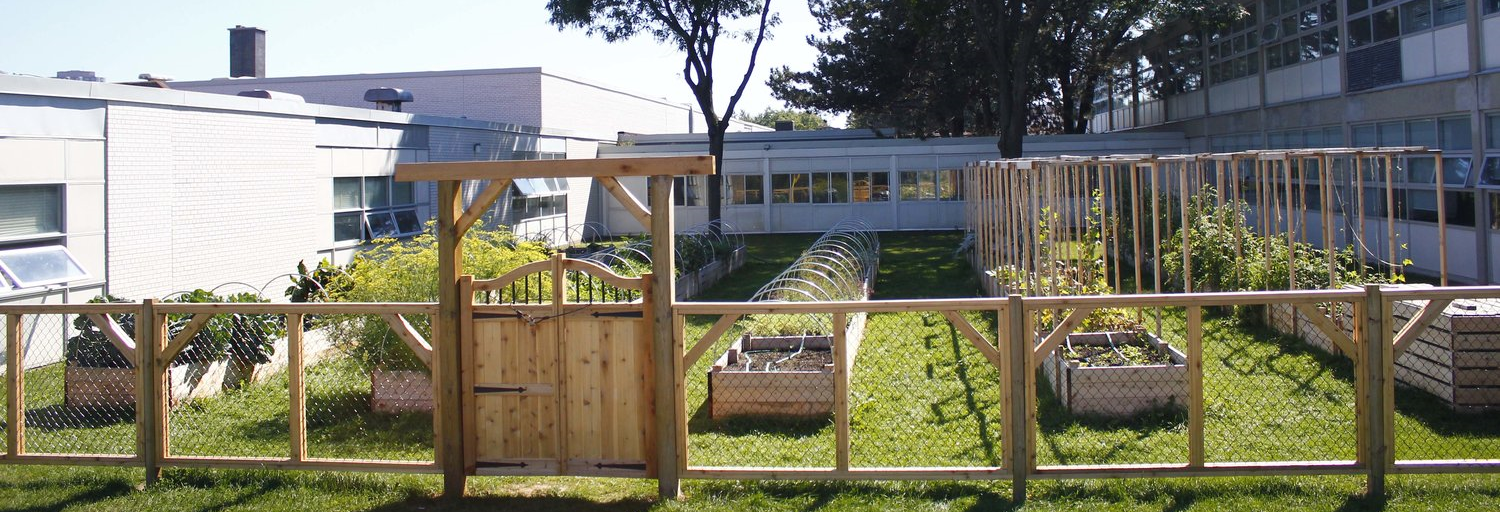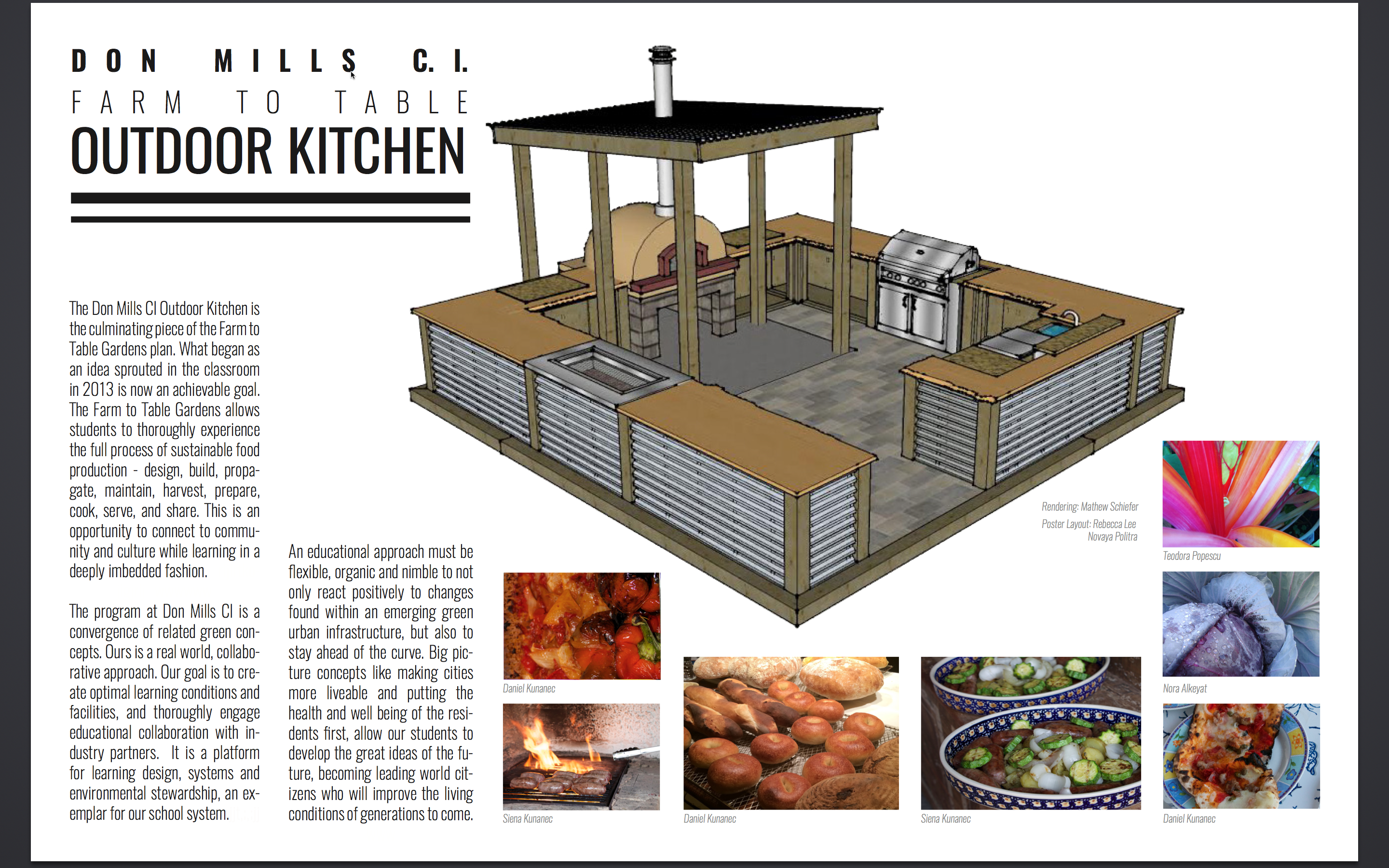EMERGING GREEN TECHNOLOGIES

The Emerging Green Technologies department at Don Mills CI is a leading organization in the development of practices, connections and possibilities found within an emerging green urban infrastructure.
The department is a convergence of related green concepts. Ours is a real world, collaborative approach. Our goal is to create optimal learning conditions and facilities, and thoroughly engage educational collaboration with industry partners and stakeholders. It is a platform for learning design, systems and environmental stewardship. Simply put, our mission is to develop the great city builders of the future.
Labour market statistics show that the combined sectors of the Green Industries represent several multi-billion dollar industries in Ontario, employing thousands of workers from multiple post-secondary pathways. Some will go directly to the workplace, others into apprenticeships or into college and university programs. Some examples of the Green Technologies sectors include horticulture and landscaping, hospitality, forestry, agriculture, architecture and design, urban planning, renewable resource management and energy technologies. We have strong and developing partnerships in these areas. We want to be a premier educational facility that engages its students in their learning. We engage deep learning through the use of many technologies, collaborative approaches, hands-on and inquiry based learning.
As we know, we live in an ever-changing world. As quickly as current sectors can be listed, new ones are emerging. An educational approach must be flexible and nimble enough to not only react positively to these changes, but also to stay ahead of the curve. Big picture concepts like making cities more liveable and putting the health and well-being of the residents first, allow our students to develop the great ideas of the future. Approaches to sustainable urban farming, local food movements and consumption, urban forestry, sustainable design and environmentally focussed entrepreneurship, are investigations that allow our students to not only have a strong foundation within their own generation, but they will also become the leading world citizens who will improve the living conditions of generations to come.
EXPLORING TECHNOLOGIES Grade 9 TIJ1O1
Exploring Technologies enables students to further explore and develop technological knowledge and skills introduced in the elementary science and technology program. Students will be given the opportunity to design and create products and/or provide services related to the various technological areas or industries, working with a variety of tools, equipment, and software commonly used in industry. Students will develop an awareness of environmental and societal issues, and will begin to explore secondary and postsecondary education and training pathways leading to careers in technology-related fields. Students will follow the design process to solve problems and create opportunities that are relevant to their lives and contribute to wider communities. An emphasis will be placed on making the world a better place through social justice and environmental sustainability.
GREEN INDUSTRIES Grades 11,12 THJ3M, THJ4M
Green industries courses offer students opportunities to investigate how to care for and sustainably manage our natural and living resources. Students will explore a variety of areas within green industries, including agriculture, floristry, forestry, horticulture, landscaping and urban planning and design.
Students will gain practical skills and knowledge by completing a variety of authentic, industry-relevant activities and projects, such as plant propagation and greenhouse maintenance activities; landscape design and planning exercises; assignments that include farm or forestry management plans; and various construction projects. In addition, students will be introduced to concepts pertaining to biodiversity, environmental sustainability, and natural versus artificial products. Students will also investigate the numerous and varied ways in which green industries and society are interdependent. Students will also examine social and economic issues related to the green industries, learn about safe and healthy working practices, study industry standards and codes, and will explore postsecondary education programs and career opportunities.
HOSPITALITY & TOURISM Grades 11, 12 TFJ3C, TFJ4C
Hospitality & Tourism courses enable students to develop or expand knowledge and skills related to the various sectors of the hospitality and tourism industries. Students will learn about preparing and presenting food, evaluating facilities, controlling inventory, and marketing and managing events and activities, and will investigate customer service principles and the cultural and economic forces that drive tourism trends. Students will develop an awareness of health and safety standards, environmental and societal issues, and career opportunities in the tourism industry.
The Hospitality & Tourism program at Don Mills C. I. is interconnected to our other Emerging Green Technologies projects. Produce supplied from our urban farm, aquaponics system and greenhouse is used with a deep investigation of the entire process of organic food supply. Facilities such as our outdoor and indoor kitchen allow for food preparation and event planning which is connected to the land and environment. Great respect is paid to traditions, seasons, and artisanal technique.
TECHNOLOGICAL DESIGN Grades 10, 11, 12 TDJ2O, TDJ3M, TDJ4M
Technological design courses provide students with a variety of learning experiences that focus on the practical application of the principles of design. These activity-based courses emphasize problem solving to meet design challenges in a wide range of areas, which may include apparel and textile design, architectural design, interior design, industrial design, and other design fields. Students learn to apply knowledge of research, historical trends, design, materials, fabrication methods, and testing criteria to develop innovative and environmentally sustainable products, processes, and/or services. The technologies and processes used to create design solutions may include both traditional and computer-based drafting methods, scale models, working prototypes, animations and simulations, displays, portfolios, and presentations.
These courses provide students with opportunities to apply a design process to meet a variety of technological challenges. Technological Design courses introduce students to the fundamentals of design advocacy and marketing, while building on their design skills and their knowledge of professional design practices.
Students will research, design, build, and assess solutions that meet specific human needs, using working drawings and other communication methods to present their design ideas. They will develop an awareness of environmental, societal, and cultural issues related to technological design, and will explore career opportunities in the field, as well as the college and/or university program requirements for them and training leading to careers in the field.
COOPERATIVE EDUCATION
Cooperative Education consists of a classroom component and a placement component. Through these two components, the cooperative education course prepares the student for successful participation in a work placement; provides sufficient time and various opportunities at the placement to enable the student to apply and further develop the knowledge and skills acquired in the related course; and provides opportunities for the student to integrate the learning acquired in school and at the placement.
Designing Your Future Grade 11 GWL3O1, CHV2OS
This course prepares students to make successful transitions to postsecondary destinations as they investigate specific postsecondary options based on their skills, interests, and personal characteristics. Students will explore the realities and opportunities of the workplace and examine factors that affect success, while refining their job-search and employability skills. Students will develop their portfolios with a focus on their targeted destination and develop an action plan for future success.
Navigating the Workplace Grade 12 GLN4OC, GLC2OS
This course provides students with opportunities to develop the workplace essential skills and work habits required for success in all types of workplaces. Students will explore occupations and careers of interest through participation in real workplace experiences. They will make plans for continued learning and work, work with others to design learning experiences, and investigate the resources and support required to make a smooth transition to their postsecondary destination.
TVO Video on Emerging Green Technologies at Don Mills C.I.
